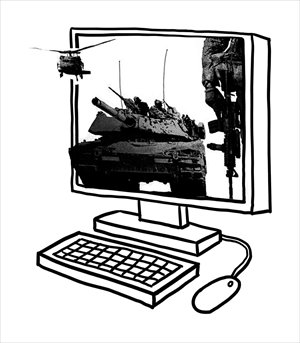Glorious Mission Online: It’s only a game

Illustration: Liu Rui/GT
Since its release at the beginning of this month, China's first online military game, Glorious Mission Online, has drawn controversy over its content in which Japan is the imaginary enemy and for its association with the PLA.
But this is nothing unusual, especially when you consider the image of Russia being the bad guy in Hollywood movies. You don't hear protest from Moscow even when their Red Square is "bombed."
And it is clear that Glorious Mission Online, which reveals the national psyche toward Japan to some degree, is only attempting to exploit it commercially.
Military fans are never in shortage in any country, which partly explains the thriving business of military magazines, exhibitions, war movies, battle-themed games and so on. China is no exception. What attracts the game developer is the market targeting military fans.
It is being touted as the first advanced military game in China, promising cool and real battlefront experiences. Veteran game players hailed it as a milestone in China's development of first-person shooters, which represents an important step for local game producers to catch up with their counterparts in the US and Japan.
However, few will deny that Glorious Mission Online entails various elements of the popular game series Call of Duty, but it is not entirely a copycat in the sense that it is firmly based on the Chinese military. The video game reflects vividly and faithfully the details of the Chinese army, including weaponry, ammunition and uniforms.
The game targets the most impressionable sector of society: young boys. An official from the game developer, Giant Interactive Group (GIG), acknowledges the attraction of the game lies in the fact that "most young boys, from the bottom of their hearts, want to be soldiers."
The typical profile of an average Chinese online gamer is a male age 18 to 30 - a perfect group for Glorious Mission Online.
GIG Vice President Gu Kai told the media that Glorious Mission Online is aimed at offering consumers a "real experience."
The company smartly capitalized on one of the most sensational topics in China: the disputed Diaoyu Islands and the nation's tangled relationship with Japan. The battleground in the game is based on one of the islands, where players will be able to "use weapons to tell the Japanese that they must return our stolen territory."
The ideal enemy? Japanese soldiers. Just like the Russians monopolize the role of bad guys in Hollywood movies, the Japanese soldiers find no competitors in playing the archenemy of the Chinese in both computer games and TV dramas.
For example, last year witnessed an inundation on Chinese airwaves with dramas themed at the War of Resistance against Japanese Aggression (1937-45). More than a third of prime time TV series on national networks in 2012 were about fighting against Japan.
Glorious Mission Online is playing on a familiar subject matter. For most youngsters, there is no chance for them to fight a real battle to protect the nation's territorial integrity, while the game provides an opportunity to vent their frustration at the Japanese.
Similar to some of the bewildering scenes in those anti-Japanese war dramas - remember a Chinese woman killed a dozen gun-toting Japanese soldiers with her bare hands? - Glorious Mission Online is also filled with some grand but poorly coordinated plots.
In a battle scene set in Shanghai in the 1940s when Japan occupied the city, Chinese soldiers are armed with advanced modern equipment, while their opponents carry World War II weaponry.
At one point, there is even a Chinese transformer called Gold Horse, who performs martial art moves gracefully along with a Chinese warrior.
Already, there are complaints by some players, who are obviously used to free stuff online, that you have to pay to download the game. Well, this is just business.
Despite all the issues some people have with Glorious Mission Online, the game has so far been warmly received, which surely is a positive signal for game company GIG and the likes. So, expect more war games on Chinese military and the involvement of Japan.
The author is a commentator on current affairs with China Radio International. opinion@globaltimes.com.cn